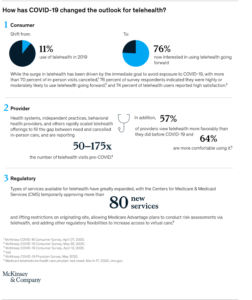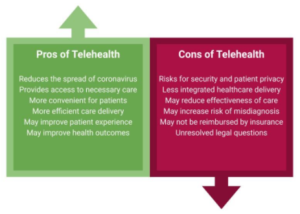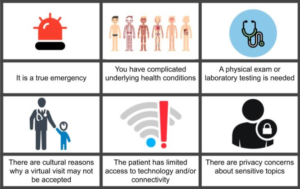Tips for Utilizing Telehealth Tools in 2020

You have a sore throat and a low fever, so you’re considering scheduling a doctor’s visit. However, you live with your elderly mother, so you’re worried about the risk of exposing her to coronavirus.
Should you go see your doctor in person, or should you try using telehealth? What are the potential risks and benefits of either choice? We’ll walk you through what services are provided by telehealth, when to use telehealth, and how to ensure you’re getting a safe and effective healthcare experience.
With this information, you should be equipped to make the best decisions for you and your loved ones. Should you find yourself a victim of medical malpractice from a telehealth experience, know that you have a formidable ally in the medical malpractice attorneys at Bertram & Murphy. Contact us for a free case review with no obligation.
What is Telehealth?
With the COVID-19 pandemic making it difficult for many patients to access in-person healthcare services, telehealth has surged in popularity almost overnight. Now 46% of consumers use telehealth to replace a canceled healthcare visit, whereas in 2019 only 11% of consumers did so. With more patients than ever turning to telehealth, providers are meeting this need with increased adoption of telehealth technology and the expansion of telehealth services (McKinsey Healthcare Systems and Services).
Experts predict that many kinds of telehealth offerings will continue to remain popular even after COVID-19. In particular, growth is expected in:
- On-demand virtual urgent care
- Virtual office visits
- Near-virtual office visits
- Virtual home health services
- Tech-enabled home medication administration
 The increased use of telehealth comes with both potential advantages and risks for patients. Telehealth services will greatly expand access to healthcare for vulnerable populations and those who live in areas with few medical resources, and the US government has recently increased Medicare coverage of telehealth services (HHS). While the telehealth industry continues to develop, there are still risks to patient privacy and some providers have expressed concern over the effectiveness of virtual interactions compared to in-person visits.
The increased use of telehealth comes with both potential advantages and risks for patients. Telehealth services will greatly expand access to healthcare for vulnerable populations and those who live in areas with few medical resources, and the US government has recently increased Medicare coverage of telehealth services (HHS). While the telehealth industry continues to develop, there are still risks to patient privacy and some providers have expressed concern over the effectiveness of virtual interactions compared to in-person visits.
Of particular interest to Bertram & Murphy is the specific legal concerns that come with telehealth services. Since there are very few legal precedents regarding telehealth services, many questions remain unresolved about medical malpractice and issues such as negligent care in the telehealth industry.
We expect areas of legal interest will likely focus on the quality of care, effectiveness of care, and training of physicians in telehealth practices (AHA). Our medical malpractice firm is ready to lead the way in helping you seek justice for any harm, negligence, or malpractice that occurs through the delivery of telehealth services.
When Should You Use Telehealth?
When choosing between using telehealth or visiting your provider in person, there are some general guidelines that may help you make your decision.
Telehealth is best suited for the treatment and monitoring of certain medical conditions. The US Department of Health and Human Services encourages the use of telehealth in situations such as the following:
- Routine healthcare (such as wellness visits)
- Medication consultation
- Dermatology
- Eye exams
- Nutrition counseling
- Mental health counseling
- Certain urgent care conditions, such as; sinusitis (a sinus infection), urinary tract infections, and common rashes
 When considering telehealth, you will want to also ask healthcare providers about the services they offer and check with your insurance about their telehealth reimbursement policies. In preparing for those conversations, it may be useful to consult online resources for advice on talking to your doctor and insurance company about telehealth.
When considering telehealth, you will want to also ask healthcare providers about the services they offer and check with your insurance about their telehealth reimbursement policies. In preparing for those conversations, it may be useful to consult online resources for advice on talking to your doctor and insurance company about telehealth.
Telehealth may not be right for everyone and is certainly not recommended for every medical condition.
Here are some situations in which the CDC does not recommend the use of telehealth services:

How should you prepare for a telehealth appointment?
After taking all these factors into account, you may decide telehealth is the right option for you. What can you now do to ensure you have the best possible experience?
The US Department of Health and Human Services recommends you take the following steps when preparing for a telehealth appointment:
- Choose a spot with plenty of light. If you’re using the camera on your phone, try turning on the flash if necessary.
- Make sure the camera is steady. This will be easier if you’re using a computer or laptop. To keep a phone steady, prop it up on a desk or table.
- Get comfortable. You’ll have an easier time focusing on the visit if your body is comfortable. This is another reason to prop up your phone — your arm will get pretty tired if you’re trying to hold the phone out in front of you the whole time!
- Wear loose clothing. If you’ll need to show the doctor something on your skin or a specific part of your body, wear something that’ll be easy to move so that the doctor can see clearly.
- Reduce background noise. This can be tricky when there are a lot of people in the house! But if you can, find a quiet activity for the kids — or your roommates — in a separate room.
- Close other applications. Some applications will slow down your internet connection. And even if they don’t, closing them will cut down on distractions.
At the end of the day, it is up to you to decide when to use telehealth services. We recommend visiting the CDC site for COVID-19 specific online screening tools and the Department of Health and Human Services site for tips on exploring your telehealth options.
If you believe you are the victim of medical malpractice, whether in-person or through telehealth services, a medical malpractice lawyer from Bertram & Murphy will advocate aggressively on your behalf for full and fair compensation.
Contact us by phone or online to schedule your free and 100% confidential consultation.














